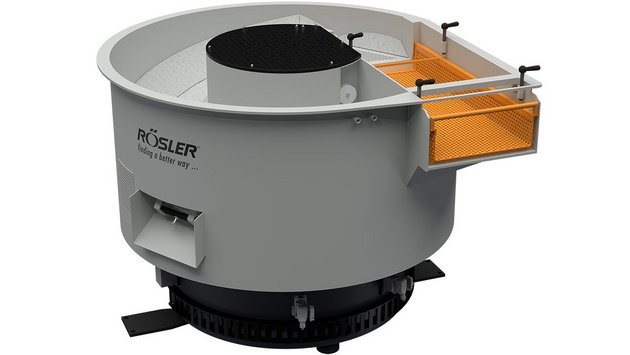
Innovative work piece drying solutions for mass finishing applications
Energy savings of up to 40%
This generation of dryers offers energy savings of up to 40% for drying the finished work pieces after a mass finishing process. They are an important factor in the implementation of a consistent energy management per standard DIN EN ISO 50001:2018 as well as environmental and climate protection goals.
Direct heating and temperature control save energy
With this developed heat block heating system Rösler can now offer rotary vibratory dryers with drying medium that allow significantly more energy-efficient drying operations. Since the heating system is now directly connected with the base plate of the processing bowl, the heat transfer takes place with minimal heat loss. This design change has reduced the energy consumption by 30 to 40 %. Further energy savings are achieved by the continuous, thermostatically controlled temperature of the drying medium. Once the set temperature for a specific drying process is reached, the heating system of the dryer is turned off and only turns on again, when the temperature falls below the pre-set level. This temperature control can be linked with the preceding mass finishing machine(s) or can be integrated into a higher-level control panel.
Energy-efficient solutions for hot air rotary and belt dryers

Hot air rotary and belt dryers are generally used for drying of work pieces with holes, where drying medium might get lodged, or for drying polished coin blanks. Since these dryer types require a high energy input as well, Rösler has also developed energy-saving solutions. For example, the integration of a condensation/drying system with a heat pump (Airgenex®) reduces the energy requirements for these machines by up to 40 %. Further energy savings can be achieved by using state of the art electronic controls. A positive side effect is that the dryers now require a significantly lower connected load. Since the dried work pieces are mostly immediately transferred to subsequent manufacturing operations or packaged, the drying temperatures can be reduced. The lower drying temperatures also ensure more comfortable work place conditions.
These energy-efficient dryers will assist the customers in the implementation of a more effective energy management per standard DIN EN ISO 50001:2018, taking effect in February 2020, which demands significant energy savings. In addition, the new dryers make an important contribution to achieving the environmental and climate protection objectives. In Germany any investments resulting in sustainable energy savings qualify for subsidies by various institutions like the federal office for economic affairs and export control and the LfA Förderbank Bavaria. Other countries and even your local utility have similar incentives to encourage energy savings.